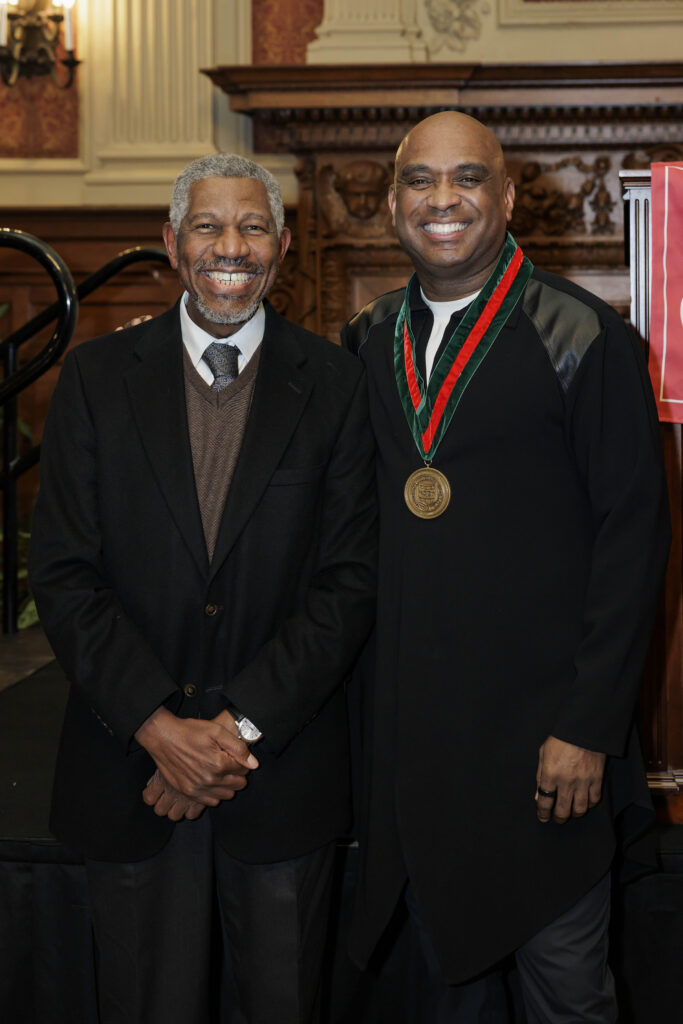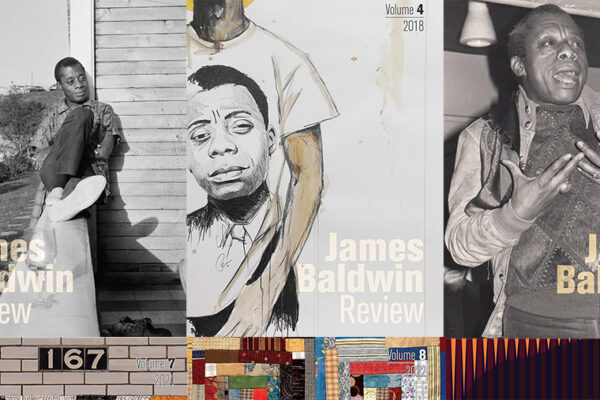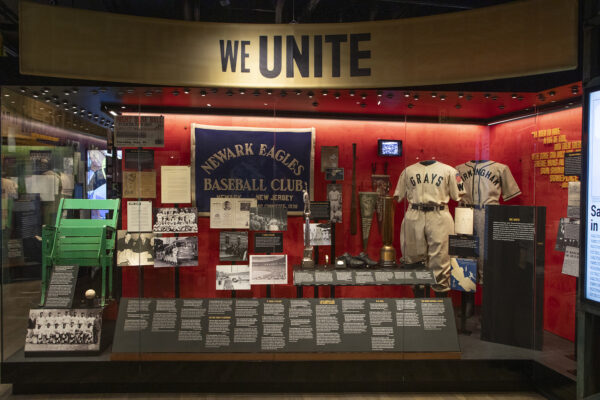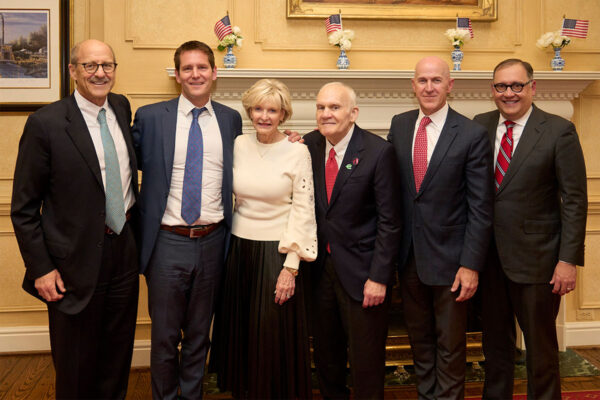Dwight A. McBride has been installed as the inaugural Gerald Early Distinguished Professor of African & African American Studies in Arts & Sciences at Washington University in St. Louis. A lecture and reception to celebrate his appointment took place Dec. 10 in Ridgley Hall’s Holmes Lounge.
A nationally recognized scholar of race and literary studies, McBride joined the WashU faculty in 2023. In addition to the Early professorship, he serves as a senior advisor to Chancellor Andrew D. Martin and as executive director of WashU’s Center for the Study of Race, Ethnicity & Equity (CRE2).

“The Gerald Early Distinguished Professorship represents more than an academic honor,” Martin said. “It commemorates the legacies of two remarkable men who have been integral to Washington University: Chancellor Emeritus William H. Danforth and Professor Gerald Early.
“By establishing this professorship, Bill Danforth ensured that Gerald’s legacy of intellectual curiosity, moral courage and deep humanistic understanding will continue to inspire generations of scholars,” Martin added.
Feng Sheng Hu, the Richard G. Engelsmann Dean of Arts & Sciences and the Lucille P. Markey Distinguished Professor, called McBride “a highly regarded thought leader.”
“Dwight’s ability to build meaningful connections with diverse communities in such a short time is truly a testament to his extensive experience as an academic leader, educator and scholar,” Hu said.
McBride, in his installation remarks, discussed his upbringing in the small town of Belton, S.C., and his career as a scholar. “I’m a true believer in the power of higher education to change lives,” he said. “I’m living proof of that.”
“While I was indeed the first African American in nearly all of the leadership roles that I entered, I was also the first openly gay person in those roles,” he said. Rising through the ranks at various institutions, he had to ignore slights while working to ensure members of the majority felt comfortable. “I wonder what more I and others like me might have achieved if unburdened by those mostly invisible but time-consuming and emotionally depleting labors.”
Society actively creates barriers to prevent Black success, McBride said, but those obstacles can be overcome. “Black genius, Black excellence, Black achievement and even Black joy all exist,” he said. “Every instance is a cause for celebration.”
Watch the full installation ceremony on the Ampersand website.
About Dwight A. McBride
Prior to joining WashU, McBride served as president of The New School in New York City from 2020-23. He previously served as provost and executive vice president for academic affairs at Emory University, where he was also the Asa Griggs Candler Professor of African American Studies and held roles in English and in women, gender and sexuality studies. At Northwestern University, he served as dean of the graduate school, among other roles. He also had been dean of the College of Liberal Arts & Sciences at the University of Illinois at Chicago.
McBride has published several books and essays on connections between race theory, Black studies and identity politics. In 2022, he was elected to the American Academy of Arts & Sciences and is also a fellow of the American Antiquarian Society. McBride is co-founder and editor of the James Baldwin Review, and a founding co-editor of “The New Black Studies” book series at the University of Illinois Press.
He is a founding co-director of the Academic Leadership Institute, and he serves (or has served) on the boards of the Institute for International Education, the Dan David Prize, the Commission on Independent Colleges and Universities, A Better New York Foundation, Consolidated Edison, and the Saint Louis Art Museum. He is a member of LGBTQ Presidents in Higher Education and of PEN America’s Champions of Higher Education.
McBride holds a bachelor’s degree from Princeton University and master’s and doctoral degrees from the University of California, Los Angeles.
About Gerald Early
Early is the Merle Kling Professor of Modern Letters in the Department of African & African American Studies at WashU, where he has taught since 1982. Early recently served as interim director of CRE2. He previously served as chair of African and African American studies and as director of the Center for the Humanities and the American Cultural Studies program, all in Arts & Sciences. He is executive editor of The Common Reader, WashU’s interdisciplinary journal.
Early is a noted essayist and American culture critic. His essay collections include “Tuxedo Junction: Essays on American Culture” (1989); “The Culture of Bruising: Essays on Prizefighting, Literature, and Modern American Culture,” which won the 1994 National Book Critics Circle Award for Criticism; “This is Where I Came In: Essays on Black America in the 1960s” (2003); and “A Level-Playing Field: African American Athletes and the Republic of Sports” (2011). He is also the author of “Daughters: On Family and Fatherhood” (1994).
His anthologies include “The Cambridge Companion to Boxing” (2019); “Approaches to Teaching Baraka’s Dutchman” (2018, with Matthew Calihman); “The Sammy Davis, Jr. Reader” (2001); “Miles Davis and American Culture” (2001); “The Muhammad Ali Reader” (1998); “Ain’t But a Place: An Anthology of African American Writings About St. Louis” (1998); and “Body Language: Writers on Sport” (1998). Early has served as a consultant on several Ken Burns documentary films, including “Baseball” (1994), “Jazz” (2001), “Unforgivable Blackness: The Rise and Fall of Jack Johnson” (2005), “The War” (2007), “The Roosevelts” (2014), and “Jackie Robinson” (2016).
Most recently, Early served as a curatorial consultant for the Baseball Hall of Fame’s new exhibit on Black baseball, “Souls of the Game,” which opened on Memorial Day weekend 2024. He also wrote a book to accompany the exhibit, slated for publication in spring 2025.
An elected fellow of the American Academy of Arts and Sciences and a member of the American Philosophical Society, he was twice nominated for Grammy Awards and has been honored with a star on the St. Louis Walk of Fame.


